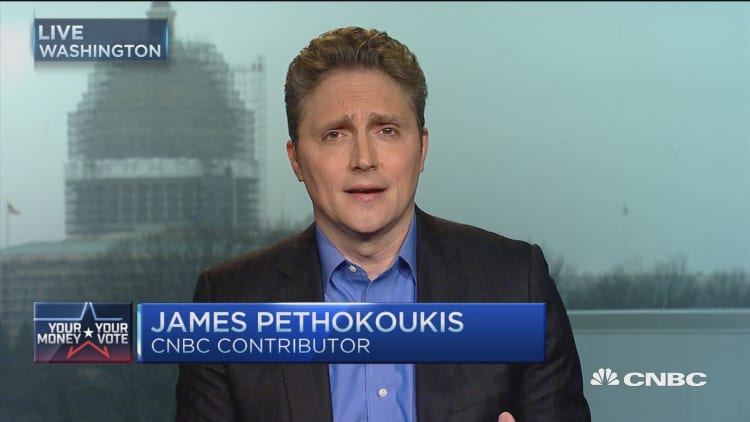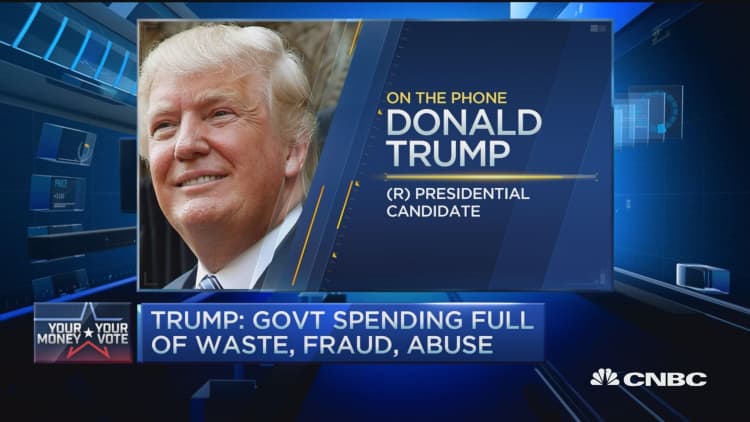As Americans go to the polls on Tuesday for primaries in five states, one big contingent that may wield tremendous influence is the small-business rank and file. The nation's 28 million small businesses represent 54 percent of all U.S. sales and have provided 55 percent of all jobs since the 1970s, according to the Small Business Administration.
This should be a day of reckoning for the candidates as Main Street tries to get its voice heard. According to a recent Manta survey, a stunning 60 percent of small-business owners plan to vote in their state primaries and caucuses. Tuesday is a big day for the six presidential candidates in both parties to receive delegates, with voting taking place in Florida, Illinois, Missouri, North Carolina and Ohio.
What's driving small-business owners to the voting booths? According to John Swanciger, CEO of Manta, a social network for small-business owners, "there are issues squeezing small-business owners from every side — the economy, taxes and health care. They are looking for a candidate who understands how their sector is being impacted."
Who comes out on top? So far, small-business owners said their No.1 pick is Republican candidate and business mogul Donald Trump in Manta's survey, which polled 8,292 small-business owners nationwide between Jan. 27 and Feb. 1. Thirty-eight percent said the businessman would be the best president for small business, while 21 percent said Democratic candidate Clinton would be.
The top concerns for small-business owners are the economy (49 percent), taxes (18 percent), health care (10 percent) and immigration (8 percent), according to the Manta poll.
Other hot-button issues: the high cost of government regulations, the minimum wage, immigration reform that would make it easier for employers to hire skilled talent from abroad through expansion of the H-1B program, and even trade policy that would affect the nation's small exporters and importers.
"Small-business owners are really concerned about the economy, and only 1 in 5 feel they have recovered from the Great Recession," said Karen Kerrigan, president and CEO of the Small Business and Entrepreneurship Council, an advocacy and education organization for start-up and small-business owners.
"Many of our 100,000 members tell us they are still in survival mode and they are looking at the candidates' policies to see how each plan will spur economic growth."
The candidates' personal ethics and beliefs will also be a deciding factor for small-business voters. Another Manta poll, of 2,432 small-business owners nationwide, revealed that 41 percent of entrepreneurs will be influenced by a candidate's ethics and beliefs.
How they stack up
As the presidential election campaign picks up momentum, many entrepreneurs and small-business owners are hungry for solutions to the issues they care about. And they are looking for the candidate who is addressing their concerns best.
"So far, the candidates haven't said a lot about small business," said John Arensmeyer, founder and CEO of the Small Business Majority, a network of 42,000 small-business owners. Although both former Secretary of State Hillary Clinton (D) and Sen. Marco Rubio (R-Florida) have outlined a small-business plan, most of the other candidates have made broad-brush proposals on many of the issues. Even the Clinton and Rubio plans lack some key specifics.
Alexander Reichmann, 27, whose business iTestCash, in Monsey, New York, offers products for secure handling of cash, worries about the impact high taxes may have on the ability of small-business owners like himself to invest money in hiring, marketing and other areas critical to business growth. He said he isn't "running toward" any of the candidates but has been interested in Sen. Ted Cruz's (R-Texas) ideas on abolishing the IRS and adopting a flat tax. Still, he adds, "I don't know his exact plans."
These election-cycle small-business issues are sharply divided along party lines. Republicans are touting tax cuts, the end of Obamacare, opposition to an increase in the minimum wage and restrictions on illegal immigration. In opposition, Democrats don't want to repeal Obamacare, but modify the law to ease mandates on small business. They want to raise taxes, increase the $7.25/hr minimum wage and ease the path to immigration (see the interactive table above for the candidates' positions on the issues).
The front-runner
Asked to choose among Republican candidates, 60 percent of respondents opted for Trump, while 16 percent cited Cruz and 5 percent named Rubio in the Manta poll. When it came to Democrats, 56 percent favored Clinton, and 40 percent named Sen. Bernie Sanders (D-Vermont).
Trump also emerged as the front-runner in a poll by Alignable, a social network for small business, where 29 percent of owners said Donald Trump would help their business most as president. Sanders (23 percent) and Clinton (19 percent) followed Trump. Alignable commissioned SurveyMonkey to conduct its nationwide poll between Jan. 26 and Feb. 10, 2016.
A big factor that has made Trump the entrepreneurial favorite is that he's a successful entrepreneur who empathizes with the challenges business owners face.
His pro-business positions: cap business taxes at 15 percent and lower individual tax rates (with a top rate of 25 percent) and eliminate the estate tax so family-owned businesses can pass along assets to their heirs; repeal Obamacare and replace it; and kill free-trade agreements, like the TPP.
In his widely discussed and controversial stance on immigration, Trump has proposed building a wall along the southern border of the U.S. to keep low-paid foreign labor from entering the U.S., and he has criticized the H-1B visa program that allows employers to hire temporary foreign skilled workers.
Michael Miller, who runs Mindwhirl Marketing in Denver with his wife, Shelly, finds Trump's brash style a bit off-putting but believes the candidate has the experience and ability to improve the economy. "I want to win again," says Miller, who says his business hasn't fully recovered from the Great Recession, as many of his small-business clients are feeling pinched.
Among the Democrats, Clinton — who says she wants to be the "small-business president" — is the front-runner for small business. She has promised she will give small businesses more access to capital, launch a national effort to cut red tape that is impeding small businesses, and provide targeted tax relief for small businesses with simplified tax filing. Her plan also includes providing incubators, mentoring and training to 5,000 small-business owners in underserved communities and developing entrepreneurial skills in young people.
Clinton has also promised to defend the Export-Import Bank of the U.S. — a quasi-government agency that helps small-business owners get trade financing — which was reauthorized in December after Congress let its lending authority lapse in July. Clinton advocates "comprehensive immigration reform, with a pathway to citizenship." She has pledged to defend the Affordable Care Act and improve it to slow the growth of out-of-pocket costs.
Sanders, meanwhile, has said he will encourage small-business lending by reinstating the Glass-Steagall Act, repealed during the Clinton administration. After the repeal, "local banks increasingly began to invest in risky Wall Street trading and speculation and became less inclined to make low-interest loans to small businesses," his website claims.
Sanders has said he also supports increased access to entrepreneurship education, patent reform to prevent abuse by big corporations, net neutrality — where Internet service providers offer equal access to all information — and visa reform, which will "reject the exploitation of workers and the use of visas for cheap, foreign labor," his website says. He also supports single-payer health care.



On the Republican side, the candidates have different approaches in support of Main Street.
Promising on his website that he will "stand up for small-business owners," Rubio promises to cut taxes for small businesses to 25 percent, let businesses immediately expense new investments and permanently repeal the estate tax. He also said he wants to repeal Obamacare, push for accountable regulatory policies, expand production of American-made energy and impose restrictions on union activity, such as prohibiting them from deducing union dues from workers' paychecks. His stance on immigration is built around securing the border.
Cruz, who announced the formation of the Small Business for Cruz Coalition in November, has proposed to eliminate the IRS and transition from the tiered federal income-tax system to a single flat tax of 10 percent. He also wants to replace the corporate tax with a 16 percent "business flat tax." When it comes to immigration, his campaign has also focused on securing the border.
Ohio Gov. John Kasich has proposed reducing the number of federal tax brackets from seven to three and cutting the top personal tax rate from 39.6 percent to 28 percent and the top business rate from 35 percent to 25 percent. He also opposes the estate tax and has proposed repealing a number of mandates of the Affordable Care Act. Kasich is also an advocate of sealing the border.
But the real test for small-business owners will be when the candidates are forced to become more specific. Jeff Salter, founder and CEO of Caring Senior Services in San Antonio, Texas, can attest to that. He is hoping to throw his support behind a candidate whose immigration policy will enable entrepreneurial companies like his franchise chain — which provides non-medical home-based care for seniors — to look for qualified workers in Mexico, to keep pace with the growth of the elderly population.
"I think it's an important election," says Salter. "I'm paying close attention to it."
— By Elaine Pofeldt, special to CNBC.com



